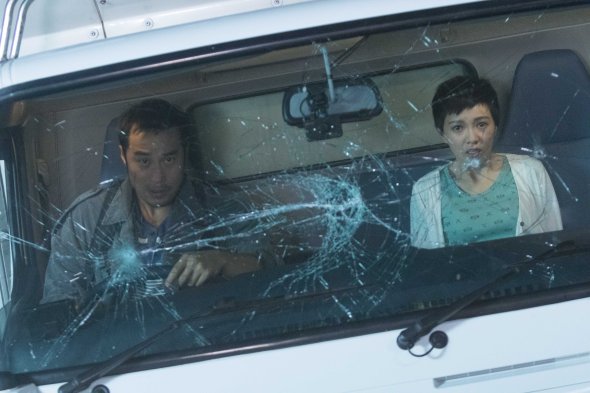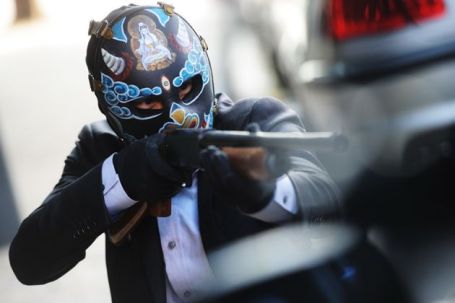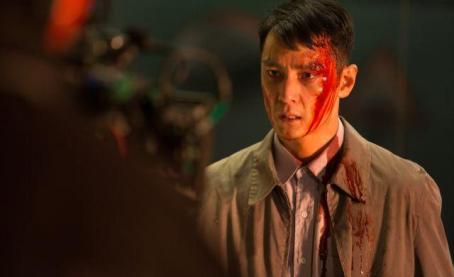Posts tagged ‘daniel wu’
Oh well: Sky On Fire film review

Daniel Wu, gun, Sky On Fire, 2016
Ringo Lam came off of a very extended hiatus in 2014 with Wild City, his first feature film in more than ten years. Although flawed, the film still show flashes of what made Lam’s movies great back in his heyday in the 1980s when he made classics such as City on Fire, Prison On Fire, Wild Search, and Full Contact with the inimitable Chow Yun-Fat. Lam’s second film in three years, Sky On Fire, just released in the U.S. and Hong Kong and like its predecessor it’s a mixed bag. But whereas Wild City retained some of the grit of Lam’s earlier classics, almost all of that texture has been sanded away in this new release.
Though not as dreadfully unmemorable as fellow Hong Kong director Dante Lam’s last flick, Operation Mekong (2016), which I forgot I’d even seen the moment after I left the theater, there’s a certain unnerving genericness to Sky On Fire that is discouraging. Lam used to be one of Hong Kong’s most distinctive directors, with a streetwise style that pulled no punches. Some remnants of that still remain in Sky On Fire but for the most part the film is unremarkable and anonymous. The film follows Tribo (Daniel Wu), the security chief of a medical research firm, as he uncovers corruption and malfeasance involving what the subtitles call “ex-stem cells,” a prized medical breakthrough that can cure cancer. Along the way Tribo tangles with a group of thieves led by a young dude named Ziwan (Zhang Ruo Yun) who have stolen the former stem cells, as well as various baddies out to get their hands on the coveted objects.

Stop, thief! Sky On Fire, 2016
In Sky On Fire there are some remnants of Lam’s former mastery. Some of the action sequences are crisp and effective, including two scenes involving hand-to-hand fighting in cramped interiors. The first, which takes place in a small kitchen, features rapid-fire fight choreography that escalates rapidly and convincingly and that displays a mastery of space, movement, and editing. The second, in a narrow hallway, includes painfully realistic-looking violence including an actor’s head shattering the ceramic tiles lining the hallway’s walls.
Similarly, a car chase through the confined streets of Central makes good use of that district’s narrow, winding roads. But besides that the film has very little Hong Kong flavor, which is probably exacerbated by the international cut being dubbed in Mandarin. At first I couldn’t even tell the movie was set in Hong Kong, which is definitely not a good sign.
Sky On Fire also suffers from a convoluted plot and a very uneven tone throughout its running time. Lam makes the unfortunate decision to include a sappy cancer-patient storyline that sucks all of the life out of the narrative. It’s not helped by the fact that Amber Kuo plays the cancer patient in question since she’s a mopey drip throughout the movie. The film alternates to ill effect between the attempted pathos of her situation and the slam-bang action of the rest of the story and neither aspect of the movie meshes with the other.

Amber cancer, Sky On Fire, 2016
By the last third of the film the wheels have completely come off as the story swerves into absurdity. The good guys end up in a fight scene in a hospital room while an incapacitated Amber Kuo lies whimpering in the bed. Suffice to say that the weapon of choice in this scene is a pole-mounted plasma bag. Following this unlikely scenario everyone including the terminal cancer patient piles into a car and speeds off, guns blazing. Luckily Tribo thoughtfully reminds everyone to buckle their seatbelts as they veer toward more vehicular mayhem. Other scenes are similarly clichéd, including a character tensely hacking something important from a desktop computer as the screen displays the download status. Can’t they just go on the cloud these days and not have to spend time breaking into an office and using a terminal? Other missteps include some very questionable CGI including fake-looking explosions and fires and a poorly matted rendering of the Sky Tower, the skyscraper where much of the action takes place.

Oh shit, Sky On Fire, 2016
The film wastes a lot of talent, from venerable Hong Kong character actors Wayne Lai and Philip Keung to Daniel Wu, who is stern and scowly but not terribly compelling. Idol drama star Zhang Ruo Yun in his first film role is adequate but unmemorable. Joseph Chang, on the other hand, gets it done with another strong performance. He’s shaping up to be a fine actor and here he combines a notable physicality with a sensitive intensity.
The movie also benefits from advances in digital cinematography as it looks slick and beautifully photographed. But all the pretty photography in the world can’t give the film coherence or make it connect emotionally, which is unfortunate given Ringo Lam’s past work. Here’s hoping he gets the chance to redeem himself with another, better movie sometime soon.
Sky On Fire opens Dec. 2 across North America
Mean As Hell: That Demon Within movie review
That Demon Within, which had a day-and-date opening in Hong Kong and the U.S. last weekend, is the latest in a series of overwrought and intense thrillers from director Dante Lam (Unbeatable; The Viral Factor; The Beast Stalker), The movie starts off with a bang with a bloody firefight in the streets of Hong Kong as a masked gang of jewel thieves shoots up the cityscape. Hon (Nick Cheung), the gang’s ringleader, ends up in the emergency room where Dave (played by the East Bay’s own Daniel Wu), the beat cop on duty at the hospital, volunteers to donate blood to the not-yet-recognized criminal. The transfusion saves Hon’s life and Dave is subsequently wracked with guilt and berated by his superiors for resuscitating the ruthless crook. The film follows Dave’s tribulations as the repercussions of his impulsively charitable act catalyze his increasingly disturbed responses.
True to director Lam’s recent output, TDW includes fraught family issues, extreme car accidents, and graphic violence with guns, clubs, blunt objects, pointed objects and other nastiness. Lam also ruthlessly exploits Chinese taboos about death as the ring of jewel thieves operate out of a mortuary and wear Chinese demon masks while perpetrating their heists. Lam makes good use of this creepy morbidness, pushing his primary audience’s superstitious buttons to heighten the film’s dark and fatalistic mood.
Lam also shows off his trademark grittiness, making good use of his mostly nocturnal Hong Kong locations and effectively utilizing his supporting cast of unglamourous character actors, as well as making the usually suave and pretty Daniel Wu look psychotically unbalanced. However, Lam’s recent box office successes and perhaps greater creative leeway have also brought his more melodramatic and overwrought tendencies to the fore, as this film’s storyline and direction at times veer far into Grand Guignol excess, with an overall sense of visceral unpleasantness resulting from Lam’s generous use of bloody violence including immolations, shootings, rape, beatings, and stabbings.
What makes the film more than a mindless shoot-em-up is Lam’s examination of a fatefully linked pair of antagonists, the guilt-ridden cop Dave and the smirking gangster Hon. Lam is known for his action set pieces but he also specializes in wounded souls who bear the collateral damage of the wreckage of their lives, such as Nick Cheung in Unbeatable tending to a traumatized mother mourning her lost child, or Cheung lamenting his lost wife The Stool Pigeon. In TDW Daniel Wu is a similarly troubled soul, looking disturbingly haggard and gaunt as he carries on the tradition started by Cheung in Unbeatable of extreme physical transformation as a badge of honor in Dante Lam films. Wu’s emblematic opacity here serves him well as his character has quite a few secrets to hide. However, it strains credulity that Dave would ever be accepted into the Hong Kong police force in the first place since it seems unlikely he’d pass the psych screening. But then we wouldn’t have a movie, I suppose.
In TDW Lam reunites with his current favorite actor, Nick Cheung, who’s fresh from winning this year’s Hong Kong Film Awards Best Actor statue for his outstanding turn in Lam’s popular MMA flick Unbeatable. Here Cheung plays a supporting role but he delivers another solid performance, as usual doing a good job as the evil gangster haunting Daniel Wu’s cop character.
Lam’s been one of Hong Kong’s most bankable directors of late and his recent successes have granted him a lot of leeway in his stylistic tics. In TDW Lam indulges himself quite a bit, at times to the point of caricature, with the film’s narrative detours and winding plot twists wandering through hypnotherapy, Chinese burial rituals, Jungian analysis, and other meandering explanations for the protagonist’s erratic behavior. However, TDW has an undeniable intensity that works more often than not and makes it eminently watchable. Hopefully it will find an audience in its U.S. theatrical release so that more Hong Kong product makes its way to the big screen in this country in the future.
now playing
AMC Metreon
San Francisco CA
and at selected theaters in the U.S. and Hong Kong
Masculin/Feminin: Shinjuku Incident + Retro Drag Revue at Marlena’s

Jackie Chan & hing dai get their game face on, Shinjuku Incident, 2009
When we arrived at the multiplex, the ticket booth marquee listed Shinjuku Incident merely as “Jackie Chan.” But when is a Jackie Chan movie not a Jackie Chan movie? When it’s directed by Derek Yee, the veteran Hong Kong filmmaker who’s known for both his hard-edged crime thrillers (Protégé; One Nite In Mongkok) as well as his sensitive melodramas (C’est La Vie, Mon Cherie; Lost In Time).
Yee’s one of the best commercial filmmakers currently working in the former Crown Colony and his films are known for an attention to character development, an intensity of emotion, and an affinity for the lives of ordinary, downtrodden people. Shinjuku Incident, which Jackie Chan produced as well as starred in, is no exception, with extreme violence alternating with sympathetic and realistic glimpses into the quotidian existences of its various characters. Although nominally a Jackie Chan vehicle it’s really a Derek Yee movie that happens to star the martial arts superstar, and both Yee and Chan do a good job sublimating Chan’s matinee idol persona in favor of a more serious dramatic characterization.
Jackie Chan plays Steelhead, a Chinese illegal immigrant living in Tokyo’s heavily Chinese Shinjuku district. He’s there to search for an old flame but falls in with other down-on-their luck Chinese, eventually getting involved with petty crimes and tangling with the Tokyo underworld. Shinjuku Incident is definitely not your typical Jackie Chan movie—there are no outrageous stunts or choreographed fight scenes and the film hews pretty closely to a gritty and realistic mis en scene. Steelhead is a real character, not just a variation on the Jackie Chan persona, although occasionally he succumbs to movie star vanity. For instance, although Chan looks every bit his fiftysomething age, both of his love interests (including anime-girl come to life Fan Bing Bing) are women in their late twenties. Probably a perk of executive producing the film, I suppose.

Droogie Daniel, Shinjuku Incident, 2009
But for the most part Chan suppresses his star status and blends seamlessly into the narrative. He’s aided by a strong supporting cast, with veterans such as Chin Kar-Lok (Young and Dangerous; Full Alert), Lam Suet (from the Johnnie To stable), and Jack Gao (Taiwanese heavy extraordinaire) adding gravitas to the proceedings. The East Bay’s own Daniel Wu is also good as Steelhead’s ill-fated buddy Jie, although the poor schmuck gets his third severe beatdown in as many Derek Yee movies. Wu transforms effectively from a timid pretty boy into coke-sniffing clockwork orangey punk who channels Heath Ledger’s Joker, complete with facial scars and smeared lipstick, as well as a crazy silver fright wig.
Unlike most pre-1997 Hong Kong productions, Shinjuku Incident doesn’t focus narrowly on the city of Hong Kong and the provincial interests of its denizens. Instead, like Johnnie To’s Exiled and Fulltime Killer, the film looks beyond Hong Kong’s narrow confines and considers the lives and existence of the Chinese diaspora that Hong Kong residents have only started to realize they belong to.
In a departure from the typical Hong Kong film, the Chinese characters in Shinjaku Incident are not the top dogs but are relegated to second-class status. Although set in Japan and directed and financed by as well as starring mostly Hong Kong natives, the film’s main characters are from the PRC, not Hong Kong, and the dialog is primarily in Mandarin, with smatterings of, Cantonese, Taiwanese and yakuza-style guttural Japanese. Even native HK performers like Jackie Chan and Lam Suet play Mainlanders and speak in putonghua.

Signifier, Shinjuku Incident, 2009
This might be indicative of the general angst that many HK residents have been feeling in the decade or so since 1997’s reunification with China, which is succinctly reflected in not one but two different scenes featuring a severed hand. Talk about castration anxiety—
Postscript: As an interesting contrast to the hypermasculinity on display in Shinjuku Incident, afterwards we stopped by Marlena’s to catch its fabulously retro drag show, The Hayes Valley Follies, hosted by Empress Galilea–the revue included awesome performances by drag queens including Chablis, Chenelle, and Anna Mae Cox. Old-school touches included lip-syncing to disco classics old and new (including Lady Gaga, Whitney Houston and, yes, Gloria Gaynor’s I Will Survive), impossibly arched eyebrows, lots of sequins and fringe, and expert tucking. It was as if the Popstitutes’ smart-ass postmodern punk rock drag never existed and we were time-warped straight back to 1975. Not that I’m complaining, of course—
UPDATE: Shinjuku Incident has just been nominated for Best Picture and Derek Yee for Best Director at this year’s Hong Kong Film Awards, to be announced on April 18.
Bonus beats: Empress Galilea tears it up at Marlena’s




Recent Comments